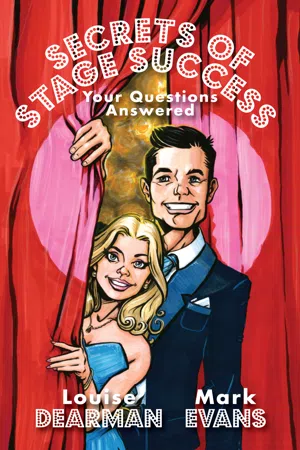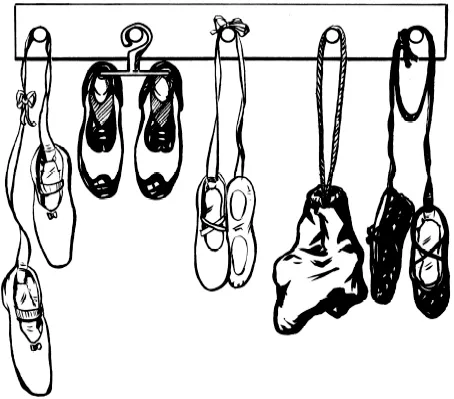![]()
Part One
Secrets of
Learning Your Craft
Training and Developing
![]()
Do you think anyone can train themselves to be an actor or is it mainly natural ability and talent?
If you define an actor as someone who ‘interprets and portrays a dramatic character’, then it could be argued that anyone can do it. When we were children, we would make believe all the time, using our imaginations effortlessly to portray cops and robbers, astronauts in space, explorers in the jungle, or pretend to be our favourite pop stars. Later in life, if we’ve ever read a bedtime story to a child, then we can all put on the voice of the Big Bad Wolf, huffing and puffing to blow down the poor little pigs’ houses. We also adopt different roles in life all the time, depending on where we are: at work, with our families, down the pub with our friends…
So everyone has a natural ability to make believe and pretend, put on voices and impersonate. And there are certainly those who have a natural gift and talent for connecting to a character on a deep emotional level, and investing in that completely until they almost become that other person. But that’s not quite the same as being a professional performer, when you need to be able to do it in such a way that connects with a larger audience, and with a certain range of skills and abilities – many of which aren’t as natural or intuitive as pretending to be someone else, but all of which can certainly be trained, developed, practised and improved.
For that reason, you should only aim to become a performer if you genuinely have natural abilities. And then we strongly believe that you should train those abilities. Acting is an exposing and vulnerable state to put yourself in, and so learning and developing in a supportive environment is invaluable. You are not a professional performer until you get paid to do it, so you need to keep working hard and developing your craft until someone is confident enough to invest in you by giving you a pay cheque!
How do I choose whether I want to work on stage or backstage?
Ask yourself: do you love performing – and don’t want to do anything else? Do you love it enough to commit your time and energy to training hard? Do you have what it takes to enjoy the highs, and to survive the lows? If you don’t answer ‘Yes’ to all these questions, but you love being around the theatre and are interested in what happens behind the curtain, then maybe a job backstage might be for you.
There are the important roles on the creative team – director, musical director, choreographer, designers (of set, costume, lights, sound, and so on). Often these jobs require a specialist training, though are sometimes done by people who have been performers themselves. Choreographers are often former dancers. Similarly, there’s an established route from people working up through the ensemble to being resident and assistant directors, responsible for looking after the show on a daily basis, up to directing productions themselves. Most of these roles, though, are done towards the start of productions, during the preparation, rehearsals and getting the show up and running; they’re not responsible for being present every day, working on the production from night to night.
There are lots of technical and backstage staff who are in the theatre every day, working just as often, and just as hard, as the performers on stage. To work backstage, it helps to have a calm, quiet and quick mind, and to be able to deal with situations efficiently without panic! The options here include stage management and stage crew, lighting and sound operators and technicians, carpenters, construction (including mechanical parts), flymen (who operate moving scenery), and the wigs, make-up and costume departments.
If you want to work in one of these roles, the best route would be to study for a qualification in Performing Arts – such as a BTEC (Business and Technology Education Council) – which will offer you a practical approach to learning without missing any of the crucial theory on the subject. You might find useful on-the-job training opportunities at a theatre – amateur or professional – near to where you live, and you should certainly get as much as experience as you can. There are some very specific kinds of work backstage, such as carpentry, and for these you might want to focus on Science and Design Technology at school, as these subjects will be the most useful to you. Another option, later on, is to take a degree in stage management or technical theatre, which are offered by many of the major drama schools.
If you want to work in theatre, then don’t forget that there are always opportunities to work front-of-house or in box offices. Many performers rely on income from these jobs while they are training, and it can also teach them how different performers deal with different audiences and challenges on stage night after night.
Should I get involved in drama at school or outside of school?
Both drama at school and extra-curricular opportunities out of school have huge benefits – whether you eventually want to work on stage, backstage, or nowhere near a stage at all. We both took part in school drama classes and after-school dance, singing and drama lessons. During school, these programmes are a great way to bond with fellow students, and a positive way to build self-confidence, express yourself in a safe environment, and enjoy some relief from academic subjects.
You will probably find that after-school/extra-curricular lessons or groups are where you will really learn and develop your dancing, singing and acting abilities. It’s more intensive and focused, especially if you work towards taking exams in your chosen discipline. Getting involved in youth theatre or amateur drama groups can also be an excellent way of getting experience, developing your skills, and spending time with like-minded people. If you join Saturday-morning classes at a stage school (like Stagecoach or Razzamataz) then you will learn a lot of skills, be pushed further, and often the teachers have worked within the entertainment industry themselves and have a good understanding of how it works. Ask around your local area whether anyone can recommend a theatre group, or search online for local opportunities. Your drama teacher at school may be able to offer some advice or there may be fellow pupils who will have similar interests in performing and will be able to recommend somewhere. Either way, any experience in performing will be great for developing your talent, whether it is in or out of school.
Did you do any professional acting work when you were children?
The first time I was properly paid to perform was when I was eighteen, as a dancer in Aladdin, a pantomime in Milton Keynes with Claire Sweeney playing the title role. It felt great to be earning a wage for doing what I loved. It was about £400 a week which made me feel rich – it didn’t last long though.
When I was twelve, I was in the choir for Joseph and the Amazing Technicolor Dreamcoat at the London Palladium. I can’t remember what I was paid, but the experience I had working on that show will stay with me for ever. (Don’t tell anyone but I’d have done it for free!)
Should I join a talent agency while I’m a child/teenager, or wait until I’ve finished my education?
There’s not really a right or wrong answer to this. We both feel strongly that childhood is a time to be happy and carefree, and there should be no mad rush to jump into working professionally. For us, dancing and singing were hobbies when we were kids – we enjoyed classes, made friends, had fun. Our parents ensured there was balance between our performing and our lives beyond that.
Of course, there are children working professionally, very happily, so if you think that you want to join an agency, start auditioning and working – and, above all, that it’s your decision and it will make you happy – then of course you can do it, if you have your family’s support. But remember that whilst life is short, your childhood is even shorter, and precious. Don’t worry about not starting professional work early in life. We started a bit later on, and it hasn’t harmed what we wanted to do, or the opportunities we’ve had.
Should I go to a theatre school, study performing arts at university, or go to drama school?
There are different options for training available to young people in the UK. Drama schools tend to offer a degree-level training for students aged eighteen and above; theatre colleges often offer options for younger students, combining training in performing arts alongside other compulsory academic subjects. Then there are universities that offer performing arts or drama degrees, with a mixture of academic and practical training.
Personally, we both believe that the best avenue to go down if you want to become a performer is a specialist course in a theatre college or drama school, which concentrates on the practical skills and will really teach you what a life in the business will require and demand of you. We don’t necessarily think you have to go at the age of sixteen (or earlier), and there is nothing wrong with studying something else at a university or on a foundation course before going on to train professionally in theatre. Many people we know in the business got a degree in a completely different subject before they started their theatre training and it hasn’t restricted them in any way.
My ‘training’ started at the tender age of three. It was, of course, just a hobby back then. I loved dressing up in a tutu and feeling like a little princess in my ballet classes. But it wasn’t until the age of twelve that I realised I wanted performing to be more than just a hobby. I’d started going to watch musicals in the West End with my parents and on school trips, and was completely in awe of the performers up there on stage, who were like pop stars to me.
I joined a choir at school and we auditioned for Joseph and the Amazing Technicolor Dreamcoat at the London Palladium. We were selected to be ‘The Joseph Choir’ and went on to perform in the show for several months, alongside Phillip Schofield in the title role. It was an incredible, eye-opening experience for me and a turning point: from that moment on, there was nothing else I wanted to do in life but perform. I continued with my dance, singing and drama lessons at the Sarah Goffe Theatre School in Leighton Buzzard, and took all my dance exams before auditioning for Laine Theatre Arts, just outside of London, at the age of fifteen. It was a college I desperately wanted to go to, having spent two years taking part in summer schools there – knowing that my idol Ruthie Henshall had trained there. I got in, and at sixteen I headed off on my adve...




